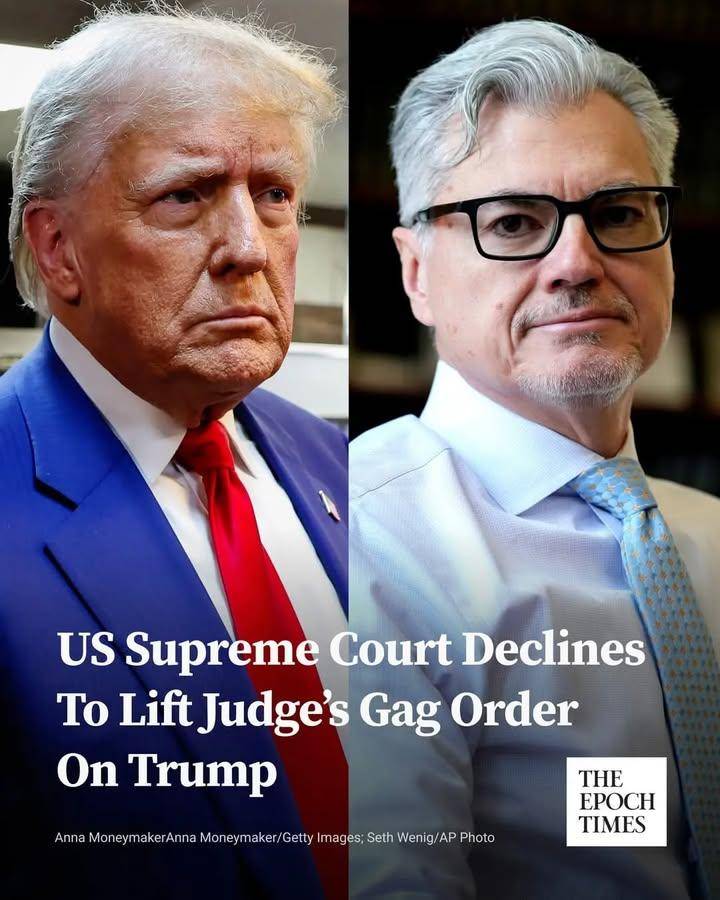The U.S. Supreme Court Declines to Review Gag Order in Trump Trial: Key Implications.
In a pivotal development surrounding the legal battles of President-elect Donald Trump, the U.S. Supreme Court has opted not to review a gag order imposed by New York Judge Juan Merchan in Trump's business records criminal trial. The gag order, initially broad in scope, was designed to limit public commentary by Trump on the prosecution team, court staff, and their families. However, after the trial in May, the order was partially lifted, allowing Trump to speak freely about Judge Merchan and Manhattan District Attorney Alvin Bragg.
This decision holds significant implications for the intersection of politics, justice, and free speech, sparking widespread public debate and media attention. Here’s a closer look at the key aspects of the case and what they mean for Trump, the judicial system, and public discourse.
The Origins of the Gag Order.
The gag order was introduced to maintain the integrity of the legal process and safeguard court officials and their families from undue influence or threats. Trump’s outspoken nature, particularly on social media, was cited as a potential risk to a fair trial. Judge Merchan’s initial order sought to strike a balance between Trump’s First Amendment rights and the need for impartiality in judicial proceedings.
However, critics argued that the gag order was overly restrictive, particularly for a public figure like Trump, whose legal battles are inherently tied to his political identity. Following the May trial, the scope of the gag order was reduced, reflecting a compromise that allowed Trump to comment on key individuals involved in his case while still shielding court staff and their families.
Supreme Court’s Declined Review: Why It Matters.
The Supreme Court’s decision not to review the gag order underscores its deference to lower courts in managing their proceedings. By leaving the order intact, the Court has signaled its unwillingness to intervene in what it may view as a state-level procedural matter rather than a broader constitutional issue.
For Trump, this means his legal team must continue navigating a trial environment with limitations on public statements. This dynamic adds complexity to his legal defense and political strategy, as Trump’s ability to mobilize public opinion is a cornerstone of his approach to controversies.
Broader Implications for Free Speech and Justice.
The case highlights an ongoing tension between the rights of individuals to express themselves and the need for judicial processes to remain impartial and free from external pressures. For a figure like Trump, whose words carry significant weight, these boundaries are particularly contentious.
Legal experts point to the partial lifting of the gag order as an acknowledgment of Trump’s unique position as a political leader and public figure. Yet, the decision to maintain restrictions on comments about court staff reflects a broader concern about the safety and well-being of judicial personnel in an increasingly polarized political climate.
What’s Next for Trump?
With the gag order’s key provisions still in place, Trump faces continued scrutiny in his business records trial. His ability to discuss certain aspects of the case remains constrained, though he has already taken the opportunity to criticize Judge Merchan and DA Alvin Bragg publicly. As the trial progresses, Trump’s statements and their potential impact on the case will likely remain a focal point for both legal analysts and the public.
Conclusion
The Supreme Court’s decision not to intervene in the gag order on Trump underscores the complex interplay between free speech, judicial integrity, and political strategy. As Trump’s trial unfolds, the implications of this ruling will undoubtedly resonate far beyond the courtroom, influencing public perceptions of justice and democracy in the United States.
This case serves as a stark reminder of the challenges in balancing individual rights and institutional safeguards, particularly when the individual in question is a polarizing political figure. The ongoing public and legal discourse surrounding this issue is likely to generate significant attention in the months ahead.



No comments yet
Be the first to share your thoughts!